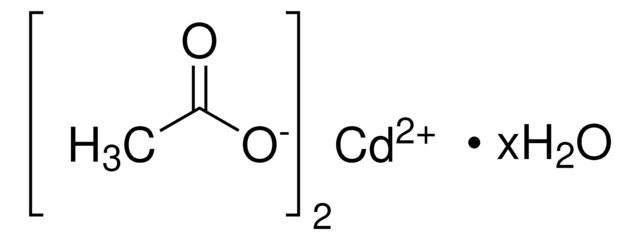642045
Cadmium nitrate tetrahydrate
98%
Synonym(s):
Nitric acid, cadmium salt tetrahydrate
About This Item
Recommended Products
Quality Level
Assay
98%
form
solid
reaction suitability
reagent type: catalyst
core: cadmium
mp
59.5 °C (lit.)
SMILES string
[H]O[H].[H]O[H].[H]O[H].[H]O[H].[O-][N+](=O)O[Cd]O[N+]([O-])=O
InChI
1S/Cd.2NO3.4H2O/c;2*2-1(3)4;;;;/h;;;4*1H2/q+2;2*-1;;;;
InChI key
QOYRNHQSZSCVOW-UHFFFAOYSA-N
Looking for similar products? Visit Product Comparison Guide
Signal Word
Danger
Hazard Statements
Precautionary Statements
Hazard Classifications
Acute Tox. 2 Inhalation - Acute Tox. 3 Oral - Acute Tox. 4 Dermal - Aquatic Acute 1 - Aquatic Chronic 1 - Carc. 1B - Muta. 1B - Repr. 1B - STOT RE 1
Target Organs
Kidney,Bone
Storage Class Code
6.1A - Combustible acute toxic Cat. 1 and 2 / very toxic hazardous materials
WGK
WGK 3
Flash Point(F)
Not applicable
Flash Point(C)
Not applicable
Choose from one of the most recent versions:
Already Own This Product?
Find documentation for the products that you have recently purchased in the Document Library.
Customers Also Viewed
Articles
The diversity of applications and nanostructured materials accessible using ultrasonic spray methods are highlighted in this article.
The diversity of applications and nanostructured materials accessible using ultrasonic spray methods are highlighted in this article.
The diversity of applications and nanostructured materials accessible using ultrasonic spray methods are highlighted in this article.
The diversity of applications and nanostructured materials accessible using ultrasonic spray methods are highlighted in this article.
Our team of scientists has experience in all areas of research including Life Science, Material Science, Chemical Synthesis, Chromatography, Analytical and many others.
Contact Technical Service















